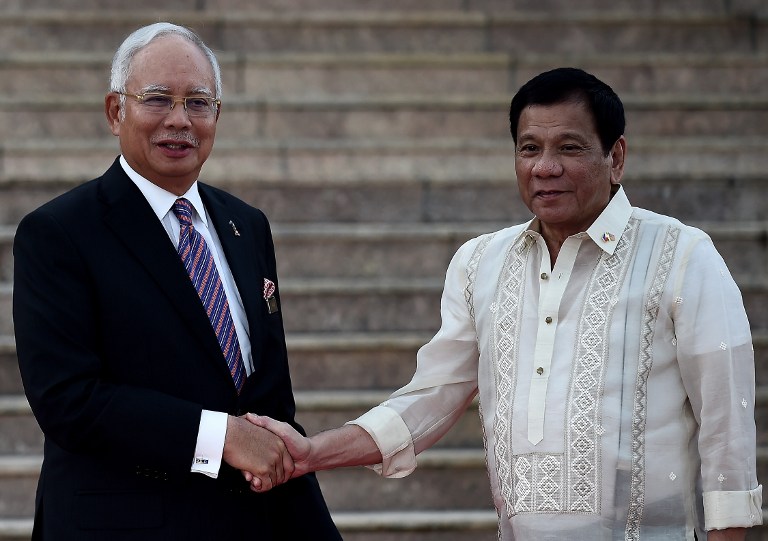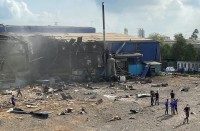
THE Philippines on Thursday (November 10) agreed to allow Malaysia and Indonesia to carry out “hot pursuits” in its territorial waters, as they look to combat kidnappings and piracy by Islamist Abu Sayyaf rebels.
The announcement was made by Prime Minister Najib Razak after a meeting with Philippine President Rodrigo Duterte, who is on a two-day visit to Malaysia.
“If we’re chasing the bad guys, for example, and we reach the international maritime boundaries with the Philippines, if we were to stop, the bad guys will get away. So we must continue pursuing them and if possible, interdict them,” Najib said at the news conference.
“But the moment we reach the international maritime boundaries with the Philippines, we have to inform the Philippine navy, they will be informed that we are entering Filipino waters and they will also try to be assisting us,” he added.
He said the agreement would be further discussed at a meeting between the three countries on November 22 in Vientiane, Laos.
Najib said Duterte had already agreed the measure with Indonesian President Joko Widodo, or “Jokowi”.
“The hot pursuit is a new development. This has been agreed by Duterte and Jokowi, and now with us,” Najib said at a press conference in the Malaysian administrative capital Putrajaya.
The waters between Malaysia’s eastern Sabah state and the southern Philippines have for years seen repeated kidnappings by the Abu Sayyaf militant group.
“We need to stamp out the kidnap-for-ransom groups. It is affecting us, Sabahans and foreigners who visit us,” Najib said.
“We have to continue to pursue and interdict them.”
Abu Sayyaf, a group linked to al-Qaeda known for kidnappings and beheadings, have been intercepting slow-moving tugboats in waters near the borders of Malaysia and the Philippines, taking captive more than a dozen Indonesian and Malaysian sailors.
Several hostages have been freed, after paying ransom to the Abu Sayyaf including of two Canadians this year.
The Abu Sayyaf has defied more than a decade of military offensives and been on a lucrative kidnapping spree in recent years.
In the latest reported incident, the Philippine military on Monday said the group had killed a German woman and abducted her companion from their yacht off the southern Philippines.
The two-day trip is the first official visit to Malaysia by the tough-talking Duterte, 71, who did not appear at the press conference.
Elected in May, Duterte has launched an unprecedented war on drugs that has left more than 4,000 people dead.
He said before arriving in Malaysia that maritime security and the fight against piracy were his top agenda items for the trip.
The three countries agreed earlier this year to increase cooperation, including possible joint sea patrols.
While the Abu Sayyaf’s leaders have in recent years pledged allegiance to the Islamic State group, analysts say it is mainly focused on running a kidnapping business rather than religious ideology.
The region around Indonesia’s borders with Malaysia and the Philippines, a major sea lane and fishing area, has seen a spate of kidnappings by gunmen and Islamist militants in recent months.
The Abu Sayyaf is holding another 15 captives, including a Netherlands citizen, five Malaysians, two Indonesians and seven Filipinos.
The two leaders have also agreed on the terms of deportations of illegal immigrants from Malaysia to the Philippines.
“We agreed that the deportations of (Filipino) illegal immigrants will be carried out in stages. We have around 7,000 illegal immigrants in our detention centres and we will send them back in stages, and President Duterte has agreed for this to be carried out,” he said.
(Reports from Reuters, Agence France Presse)







